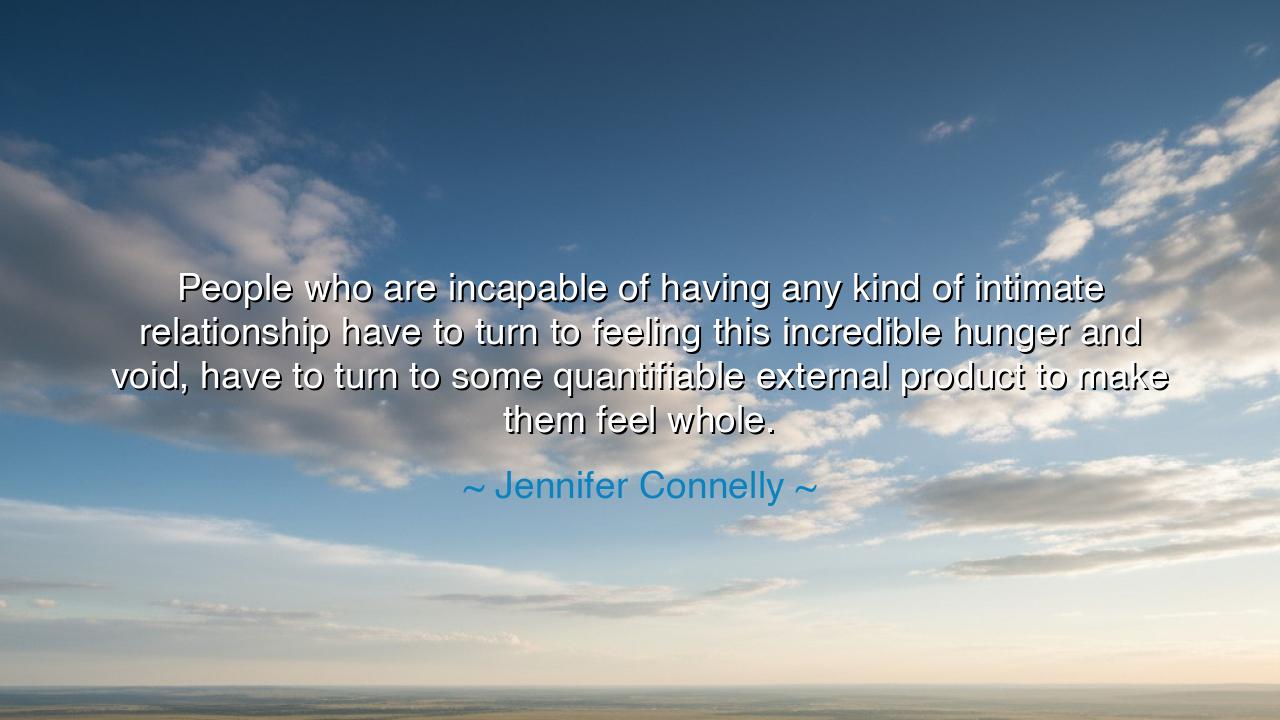
People who are incapable of having any kind of intimate
People who are incapable of having any kind of intimate relationship have to turn to feeling this incredible hunger and void, have to turn to some quantifiable external product to make them feel whole.






Hear now the solemn words of Jennifer Connelly, who spoke with piercing truth: “People who are incapable of having any kind of intimate relationship are driven by an incredible hunger and void, and must turn to some quantifiable external product to make themselves feel whole.” These words are a mirror held to the soul of humanity, revealing the silent famine that dwells within those who cannot give or receive love. For when the heart is closed, no treasure of this world can truly fill its emptiness.
In the ancient days, the elders taught that man is not sustained by bread alone, but by the bonds of connection. An intimate relationship — whether with a beloved, a friend, or the divine — is like water to a parched spirit. When this sacred flow is severed, a great void opens within, and the soul begins to wither. In its thirst, it seeks false fountains: gold, possessions, power, and fleeting pleasures. These quantifiable external products may dazzle the eyes, yet they cannot heal what lies broken within.
The hunger Connelly speaks of is not of the flesh, but of the spirit. It is a relentless craving, like a beast that devours without satisfaction. The more one feeds it with outward things, the more ravenous it becomes, until the seeker is trapped in an endless cycle of grasping and despair. Only love — true, vulnerable, and enduring — can quiet this beast and bring peace to the heart.
Let future generations heed this warning: the path to wholeness is not found in the marketplace nor in the glittering trophies of the world. It lies instead in the courage to open oneself to intimacy, to embrace another soul and be embraced in return. For when love flows freely, the void is filled, and the spirit rises, no longer chained to hollow substitutes. Then, and only then, shall a person become truly whole.






DTHa Do Thu
This quote speaks to the idea of people using material things to mask emotional emptiness. It seems like society often glorifies external success, but doesn’t address the real emotional needs people have. I’m curious, how can we shift our focus from external validation to building healthy relationships? Is it possible to heal that void without first learning to connect with ourselves and others?
NTNhat Tran
Jennifer Connelly’s words really hit home. There’s a constant push in today’s society for people to find happiness and wholeness through things, whether it’s money, status, or possessions. But do these things ever truly fulfill us? It makes me wonder—can we be content without emotional connection, or do we always feel that hunger for something deeper? How do we strike a balance between external and internal fulfillment?
H815-Cao Cu Huy 8/11
I find this quote pretty striking. It suggests that when we lack intimacy or emotional connections, we seek fulfillment in things that don’t truly satisfy us. It makes me think—why is it so difficult for some people to form intimate relationships? Is it because they fear vulnerability, or is it something deeper, like past trauma or a lack of self-awareness? What do you think causes that disconnection?
ANphuong anh nguyen
This quote really makes me reflect on how many of us turn to external things to fill emotional gaps. Whether it's material possessions, social media, or even food, it seems like we’re constantly trying to fill a void that’s really about deeper connections. Do you think this need for external validation stems from childhood or more from societal pressures? How can we work toward building those deeper, meaningful connections instead of relying on external factors?